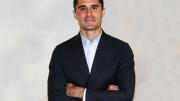For a child raised in the United States, Charles Altchek ’07 had an unusually soccer-focused upbringing. The son of a French mother, he spent his summers playing soccer in France and attended French American school in Westchester County, New York, where he spoke French and played soccer at recess. When he left to attend high school at the Horace Mann School, he knew practically nothing about lacrosse nor American football—but that didn’t matter. Soccer helped bring him to Harvard, where he earned back-to-back Ivy League Player of the Year awards in 2005 and 2006 (the first player to do so since the 1980s), served as captain, and led his team to the 2006 Ivy League championship title.
After graduation, Altchek retired his jersey and took a role on the Goldman Sachs trading desk, but he found himself thinking about other things before he went to bed at night. Then he found his way back to the sport he loved at Columbia Business School, joining the business development division with the New York Red Bulls in 2014. He moved from there to Major League Soccer’s commissioner’s office, and in March, Altchek became the inaugural president of MLS NEXT Pro, Major League Soccer’s new developmental professional league. Operating out of 21 clubs across the country, the MLS’s new minor league plays a similar role as the National Basketball Association’s G-League or Major League Baseball’s AAA division. For U.S. soccer it’s the first of its kind—and a chance for Altchek to grow a U.S. audience that he feels the game deserves.
Altchek explains that soccer operates differently than other professional sports; its players often sign professional contracts at age 16 or 17, while U.S. basketball or football stars usually sign contracts during or after college. MLS NEXT Pro, then, is the last rung on the developmental ladder, a place where young players can take time to mature and improve their skills before turning professional. The new league—comprising both MLS-owned teams and independent clubs—works to invest not only in infrastructure, stadiums, and training facilities, but also in developing the next generation of talent on the field. “Coming out of the World Cup in 2014, there has been so much energy around the sport, mainly in the MLS,” says Altchek. Since then, the MLS has added 10 new teams, with another on the way in 2023.
But Altchek and the new league are building toward the 2026 FIFA World Cup, which is set to take place in the United States, Canada, and Mexico. (The events’ 16 host cities were announced this month.) Their initiatives to expand MLS NEXT Pro in the United States are about building momentum and talent in preparation for the global event. Altchek hopes to expand the new league to between 40 and 50 teams in advance of the World Cup and showcase how the game has grown in the United States. “Being innovative is a big part of what we do here. New rules, new technology, new concepts,” he says. “We want to push the game forward.”
Altchek has been pushing the game forward since he arrived at Harvard in 2003—then, wearing cleats instead of a suit. As a striker, he “squeezed the most lemonade out of the lemon,” as he puts it. In 2006, after he scored a league-leading 12 goals, The Crimson called him “one of the most pivotal players in the history of the Harvard Men’s Soccer team.” Altchek kept focused on building his skills even when the team wasn’t competitive, which, as he jokes, was most of the time until his senior year. “I took great pleasure in the process,” he says. “Making the plan, having the plan, and sticking to it.”
What Altchek does now at MLS NEXT Pro isn’t so different. Transitioning from a trading desk to professional sports management, he quickly realized that “this isn’t the financial markets where you can unwind the trade and move on. The decision sticks and we have to live with it.”
It’s challenging to run a league, and Altchek has a hand in every component, from fan engagement to sponsors to personnel decisions. The first few months were one of those “build the plane as we’re flying it” experiences, he says. But that’s what makes it so exciting. Every decision he makes sets a precedent. Moving forward, he hopes to see how closely MLS can compete with European leagues. Just last week, the league signed a new global media deal to broadcast all of its games on Apple TV+ starting next year, a partnership that include MLS NEXT Pro. “If there’s a story to be told about MLS, it’s about being willing to take risks,” he says. “It’s no longer about ‘Can this sport make it?’ but ‘How big can it get?’”
Regardless of future expansion, for Altchek, the sport always comes back to where he started: at recess, kicking around the soccer ball. “Anything you can think of that separates people, soccer brings them together,” he says. “That’s why they call it the beautiful game.”









